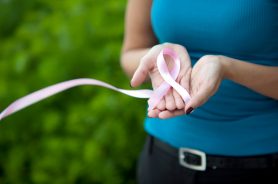Your first mammogram: What to expect
Do you need genetic testing for breast cancer?
Being able to identify if you’re at increased risk for breast cancer because of family history is powerful.

You’ve seen reports about women with a family history of breast cancer choosing preventive surgery to significantly reduce their breast cancer risk. Since your grandmother, mom or sister has had breast cancer, it’s got you wondering: Do you need genetic testing to find out if you’re more likely to develop the disease?
“Being able to identify if you’re at increased risk for breast cancer because of family history is powerful,” says Banu Arun, M.D., professor in Breast Medical Oncology and Clinical Cancer Prevention, and co-medical director of Clinical Cancer Genetics at MD Anderson. “If your chances for developing the disease are higher, you have options to reduce those chances by up to 95%,” Arun says.
Yet, most cancer cases aren’t related to family history. “Only about 5 to 10% of cancer cases are related to genetics,” Arun says. This means that genes linked to cancer pass from one blood relative to another.
Below, Arun shares the information you need to decide if genetic testing for breast cancer is right for you.
Know your family’s cancer history
You can start to understand your risk for inherited breast cancer by mapping your family’s cancer history.
Check for these factors to determine if you may be at risk:
- You had breast cancer before age 50.
- You had high grade serous ovarian cancer.
- You had breast and high grade serous ovarian cancer.
- You have relatives with breast, ovarian, pancreatic or prostate cancer.
- Any men in your family had breast cancer.
- You are of Ashkenazi Jewish ancestry.
- A family member has a BRCA1 or BRCA2 genetic mutation.
“The most important thing is to identify first- and second-degree relatives who’ve had breast cancers in the family, and to know the ages at which they were diagnosed,” Arun says. If you’re unable to map your family’s cancer history – you may be adopted or not in touch with relatives – but had cancer at an early age, then you can undergo genetic testing. If you don’t have a personal history, but are still concerned, speak with your doctor.
Discuss your family history with your doctor
If your family history raises some red flags, take your complete family history form to your doctor to talk about your cancer risks. If your personal history has you worried, you also can seek your doctor’s advice.
“Your health care provider can help you decide if you should speak with a genetic counselor,” Arun says. “Genetic counseling is very comprehensive and important for understanding your inherited cancer risks.”
A genetic counselor will review your family’s medical history, discuss the role of genetics in cancer and perform a hereditary cancer risk assessment. Based on your cancer risk assessment, the genetic counselor may recommend genetic testing, which is a simple blood draw.
Understand the genes linked to breast cancer
If you learn that you have a family member with a gene linked to breast cancer, such as BRCA1 or BRCA2, don’t panic. Most breast cancer cases aren’t genetic. However, if you opt for genetic testing and find out you also have the gene, here’s what that means.
Most women that have a BRCA1 or BRCA2 genetic mutation, which is an abnormal gene, are diagnosed with Hereditary Breast and Ovarian Cancer (HBOC) syndrome. “This means you have up to an 87% chance of developing breast cancer,” Arun says.
It’s important for women with HBOC to begin cancer screening exams early. MD Anderson recommends:
- Age 25 to 29: annual breast MRI.
- Age 30 or older: annual mammograms and breast MRI, alternating the mammogram and breast MRI every six months.
Preventive surgery to remove the breasts, or prophylactic bilateral mastectomy, is another breast cancer risk management option. “It’s a very aggressive approach, but reduces your risk by up to 95%, which is why so many women are choosing it,” Arun says.
Assess genetic testing pros and cons
Finding out you have a genetic mutation means you can help prevent breast cancer or find it early, when your chances for successful treatment are highest. But your decision won’t just affect you. Your test results also could predict your family member’s cancer risks.
“Genetic counseling and testing is a very personal decision, and people need to want to know this information. Then they need to be ready to do something about it,” Arun says.
You can also schedule your mammogram at other Houston area locations:



